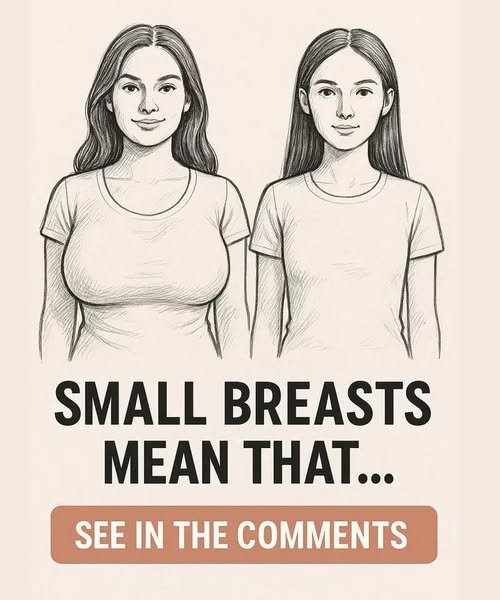Breast size has long been a topic of cultural fascination, personal curiosity, and sometimes even insecurity, yet its relationship to health is widely misunderstood. Many people assume that the size of a woman’s breasts somehow reflects her hormonal balance or overall well-being, but this belief is more myth than fact.

The truth is that breast size is primarily determined by a combination of genetics, hormones, age, body weight, and lifestyle habits, and it does not serve as a reliable indicator of a woman’s health. Some individuals believe that smaller breasts reflect poor health or reduced femininity, but such assumptions are not supported by science and only reinforce damaging stereotypes. Health is far too complex to be assessed by one physical characteristic. Energy levels, immune function, metabolic health, mental wellness, and resilience against disease are much more accurate reflections of how healthy a person truly is.
To reduce health to something as superficial as breast size ignores the vast and intricate interplay of biology, lifestyle, and environment that defines well-being. Scientific research has occasionally found associations between larger breast size and certain health risks, such as type 2 diabetes, but these links are usually indirect and tied to body weight rather than breast size itself. People with higher body mass tend to store more fat in different areas of the body, including the chest, so larger breasts may simply reflect broader patterns of fat distribution. This is not an inherent health problem with the breasts themselves but rather a signal of overall body composition, which in turn may influence conditions like diabetes or cardiovascular strain.
This distinction is important because it shows that breasts are not an isolated factor in health, and they should not be treated as such. Every woman’s body is unique, and breast size variation is completely normal. Some women naturally have smaller breasts, others larger, and many experience changes over time due to pregnancy, aging, hormonal fluctuations, or weight shifts. Instead of comparing one body type to another, the focus should be on supporting long-term wellness through habits that improve the function of the whole body. What truly matters is how the body performs, how balanced its systems are, and how well it is cared for.
Maintaining hormonal balance is one of the keys to health, and this can be achieved by paying attention to nutrition, physical activity, stress management, and sleep. A diet rich in whole foods, adequate protein, healthy fats, and plenty of fruits and vegetables helps stabilize hormones and supports energy and immunity. Regular exercise not only maintains a healthy weight but also regulates insulin sensitivity and improves circulation, which benefits the entire body, including the reproductive system. Stress management is equally important, as chronic stress can wreak havoc on hormones like cortisol, which in turn disrupts menstrual cycles, metabolism, and mood.
Practices such as yoga, meditation, or even daily walks can reduce this strain. Some people turn to natural remedies to support hormonal health, such as sage tea, maca root, or targeted supplements, but it is crucial to do so under medical supervision. What works for one person may not work for another, and inappropriate use of herbs or supplements can sometimes do more harm than good. Professional guidance ensures that these remedies are integrated safely into an overall health plan rather than used as quick fixes. Ultimately, breast size is not a reflection of how healthy, feminine, or valuable a woman is.
True well-being comes from the way the body is supported and cared for, not from how it appears. Building confidence and strength involves respecting the natural form you were given and prioritizing habits that nurture your body rather than attempting to conform to external ideals. Society often places disproportionate value on appearance, but health is far deeper than what can be seen on the surface. Women thrive best when they embrace their individuality, focus on self-care, and cultivate balance in their lives. Confidence grows from the inside out, and good health is sustained by consistency, not by physical size or cultural standards. Respecting your body’s natural form and providing it with the nourishment, activity, and rest it deserves is the foundation for both confidence and long-term health.





